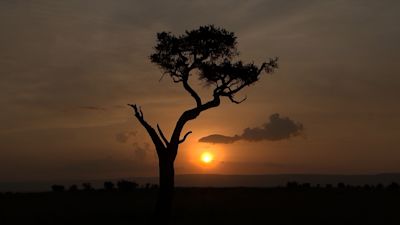Why more Kenyans are holidaying at home during the pandemic

ITV News Senior International Correspondent John Irvine reports
For three hours the lead zebra wandered up and down the riverbank and a hundred others followed.
Several times the stallion looked like he was about to take a first step into the water but then backed off.
And who can blame him – he was contemplating the most dangerous river crossing in the animal kingdom.
The Mara river is full of crocodiles and the migration of wildebeest and zebra – including the treacherous river crossing – is the main reason American and European tourists havetraditionally paid big money to come to Kenya’s Masai Mara game reserve.
This place must always be a magnificent spectacle to behold, but this year, in the time of coronavirus, there’s a difference – who is coming to take it all in.
For the first time ever ordinary Kenyans are going on safari here in large numbers.
That’s because in the absence of well-heeled foreigners, kept away by Covid restrictions, prices have dropped dramatically.
This has enabled many more Kenyans to visit this storied corner of their own country.
“It’s amazing. On our first drive we saw a leopard and elephants.
"It’s really beautiful,” said Kate Thiiri, a telecoms engineer who travelled here with her husband and young son from their home in Nairobi.
'Tourism was worst hit by Corona - I'd like to see people reaching out and helping'
“We are opening up our eyes and our hearts to what we actually have,” said James Josiah, again from Nairobi.
Last year many hotels and lodges in the Masai Mara were forced to close because there were no tourists, neither foreigners because of coronavirus, nor locals because it was tooexpensive.
Safari guides and other people dependent on the tourism industry were laid off.
Now they have their fellow citizens to thank for getting their jobs back.
'My heart was breaking for Kenya'
Coronavirus has many unforeseen consequences, but few unforeseen dividends.
That has made it possible for more ordinary Kenyans to appreciate this magnificent sight is one of them.
Having sold the crocodiles several dummies the lead zebra finally chose his crossing point and took that daunting first step.
The crocs had too far to swim to intercept the herd as it waded through and within threeminutes all the zebras were safely across.
It was a privilege to watch them.
Listen to our latest coronavirus podcast: